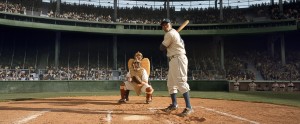42 struggles under weight of own message
Making a great movie about a great man is difficult. 42, Brian Helgeland’s biopic of baseball legend Jackie Robinson, is Exhibit A.

Play ball · Chadwick Boseman portrays Jackie Robinson, one of the greatest baseball legends of all time. The biopic, 42, shows how Robinson persevered as the first black professional baseball player. – Courtesy of Warner Bros. Pictures
Rationally, Robinson’s story demands proud display. Here is a good man, talented and humble, who is put under unbelievable pressure and unjust adversity. The man faces them with uncommon courage and not only overcomes them, but also does so in an exceptional way. Robinson’s accomplishments transcended sports, and his courage partly inspired the civil rights movement that came about eight years later.
A movie about his struggle almost had to be made, and in theory, the movie is (forgive the word choice) a home run. But in practice, it is not nearly as impressive, bending under the weight of its own message.
The movie centers on the events during the summers of 1946 and 1947. Brooklyn Dodgers owner Branch Rickey, played extremely well by Harrison Ford, decides he wants to hire a black player. He realizes that both the player and the team will face an intense amount of resistance: Black players were allowed to play in the minor leagues through the 1880s, but when the major league was created, black people were prevented from joining.
Rickey knows this, and he knows what it would mean for the player. During the search at the beginning of the movie, he not only looks for a great baseball player, but someone who is strong enough to take the abuse he knows is coming and turn the other cheek instead of fighting back, which could be been turned around by racists as simply an indictment of black aggressiveness.
He finds his man in Robinson, a multisport athlete at UCLA and ex-Army officer. Played by relative unknown Chadwick Boseman, Robinson signs a contract, and his fight begins. For the rest of the film, he has to deal with vitriol from fans, opposing players, umpires and even teammates.
Racism comes at Robinson nonstop; the movie pulls few punches in showing just how constant it was. A group of teammates petition to get him off the team, a sheriff threatens to shut down a game if he continues playing and threat letters continue to be directed at him.
Robinson had to walk through fire to integrate baseball, and 42 makes sure you don’t miss the heat. There is a scene where an opposing manager yells abuse at Robinson for what seems like half an hour, and the scene keeps on and on, making you watch helplessly. It is disquieting, to say the least.
The movie rightly focuses on this struggle against racism and the toll it takes on Robinson, who is constantly on edge, wondering from where the next attack will come. You are shown just how difficult it was, and through impassioned speeches by Rickey and a handful of other supporters, you are reminded just what a huge significance this all has. It is impossible to watch the movie and not see the fight this man had to endure — all the things thrown at him and what it ultimately meant to so many people.
Unfortunately, it is possible to achieve all this and still come out objectively flat as a movie.
You are shown and told everything you need to hear. Perhaps the problem is that despite everything you are shown, the movie fails to make you feel much of anything. The message is powerful, but the movie unfortunately is not.
You are spoon-fed the message because Helgeland clearly and rightfully did not want you to miss it. It is an important message, but a director sometimes must trust his audience and his own directorial powers. In an effort to make sure you see the symbolism of Robinson, the movie sacrifices its cinematic quality.
In a way, Biopics about people with troubled lives are much easier to write than those which focus on role models. It’s definitely possible, as Lincoln showed us just a few months ago, but is very difficult. A powerhouse performance from Daniel Day-Lewis’ definitely helped in that case, but Boseman and Ford are definitely not at fault for 42’s failings. Lincoln is a superior movie because it did not simplify its message to the lowest common denominator and hit you over the head with it. It showed you the drama and, save for a corny scene to open the movie, let it speak for itself.
The Jackie Robinson story is one worth knowing, and it is difficult to find a better medium to make an impact than the big screen. The movie should be seen and the message should be taken in because what Robinson did deserves recognition and understanding.
However, if the director had trusted his audience a little more, the movie would not have to survive on message alone.
